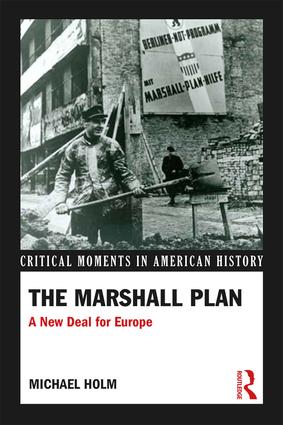Michael Holm’s New Book Examines U.S. Global Agenda in Post-War Europe
 This year, the United Kingdom shocked the world and many of its own citizens when it voted to exit the European Union. The vote struck a blow to the idea of European unity and collaboration—a few of the themes whose origins Michael Holm examines in his new book, The Marshall Plan: A New Deal for Europe (Routledge).
This year, the United Kingdom shocked the world and many of its own citizens when it voted to exit the European Union. The vote struck a blow to the idea of European unity and collaboration—a few of the themes whose origins Michael Holm examines in his new book, The Marshall Plan: A New Deal for Europe (Routledge).
Holm, lecturer of social sciences at Boston University College of General Studies, specializes in U.S. foreign policy, twentieth century political history, diplomatic history, and immigration history. His book examines the period between 1945 and 1951, when the world was exploring how to remake itself after World War Two. The United States approached the postwar era with a global agenda to spread the American way of life across the world by “recreating the world to make it liberal, democratic, capitalistic,” he says. This vision—which Holm calls “a massive, ambitious agenda for reshaping the international order”—included building the United Nations, promoting global human rights, and conceiving the institutions that eventually became the World Bank and the International Monetary Fund.
While nations like Great Britain and France feared a reemerging Germany and were anxious about the end of protectionism and the dismantling of empires, London and Paris’ anxieties were trumped by Washington’s influence and their own need for U.S. support. The Marshall Plan became a key component of the U.S. agenda, as it leveraged over $12 billion in aid to persuade Europeans to conform and join the American-designed idea of the “West” and to stop the spread of Communist west of the Iron Curtain.
Holm adds to previous research on the Marshall Plan by arguing that the Plan was not a Cold War invention but rather a continuation of the thoughts and debates already taking place during the war.
The Marshall Plan encouraged the idea of Europe as one entity rather than as a conglomeration of often-warring nations. Holm says: “In many respects, the Marshall Plan’s great legacy is that it forced the Europeans to collaborate in a way they had no history of doing.” Prior to 1945, European history was one of diplomatic quarreling, war, and economic protectionism, says Holm, but the Marshall Plan broke down those barriers. That collaboration laid the groundwork for the European institutions we have today.
Holm said his goal is to give students a new framework for understanding America’s role in this period and the decades following. The book is described as “a much-needed re-examination of the [Marshall] Plan” and a “key resource for students of America’s role in the world at mid-century.” Explore the history and timeline of the period in the book’s accompanying website and its documents, multimedia links, and online resources.